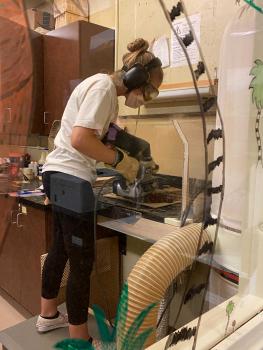Faculty-Student Research In-Person for Summer, Continuing in Fall

This summer, the Biology department jumped back into their in-person faculty-student research opportunities, which were previously moved online or halted during the pandemic.
Duckweed v. Mosquitos
Associate Professor of Biology Dr. Chris Binckley is working with Biology majors Alyssa Gushka ’23 and Zac Runkle ’23 to look at how different species of duckweed affect where mosquitoes lay their eggs. Duckweed is an aquatic plant that floats on the surface of the water, and previous research demonstrated that one species of mosquito avoids laying its eggs in these plants since it kills mosquito larvae. Now, Dr. Binckley and his students are expanding to look at three other species of mosquitoes to see if the duckweed plants cause other mosquitoes to avoid laying their eggs there and if it also kills their larvae.
“We are not sure how the plants kill mosquito larvae, but it might prevent them from breathing at the water surface, or produce chemicals that directly kill larvae, or they might reduce nutrient levels in the water that starve the mosquito larvae,” said Dr. Binckley. “Duckweed plants are a relatively easy and inexpensive way to reduce mosquito populations, and we are hoping that they cause reduced egg-laying and kill larvae from multiple mosquito species.”
They will be running experiments to test those hypotheses, which continues the work they started two summers ago.
Embryonic Survival and Development
Assistant Professor of Biology Dr. Christina Swanson has three students in her research lab, Biology majors Jayson Cortes ’22, Gwendolyn Resch ’22, and Jonathan Noble ’23. All of the students are using Drosophila melanogaster, or the vinegar fly, as their model. Cortes is examining the regulation of cell proliferation in the early embryos, specifically looking at the roles of small non-coding RNAs called “miRNAs” in regulating cell division, embryonic development, and embryonic survival.
Noble and Resch are examining the role of protein degradation in egg development, called oogenesis, and have found that the degradation of the protein Dacapo is required for female fertility and are now exploring why that is. Both Noble and Resch are studying the degradation in the ovaries of female adult vinegar flies.
Fire Up the Sanders
Associate Professor of Biology Dr. Lauren Howard, along with his summer student researchers, Biology students Rikki Rosenthal ’21, Katherine Haines ’21, ’22, Jacqueline Hanson ’23, and Carly McElroy ’22, are continuing the work of collecting fire scar and tree ring samples from Rocky Gap State Park, Md., in addition to sanding and measuring collected samples.
The information collected by analyzing the samples will help the research team develop a timeline of fires for Sideling Hill, Md. from 1700 to today. The information that they collect also helps the Nature Conservancy and the Maryland Department of Natural Resources to design effective strategies to manage the land with controlled burns.
“I started in the lab when we were all online, so until this summer I’ve only worked with measuring samples digitally from scans from Dr. Howard,” said Haines. “Now for the first time I’m getting to work hands-on with the samples and it’s a much more rewarding experience getting to follow the process from the beginning instead of just working on the end portions. The noise from the sanders and the smells of pine in the lab makes it a much more real experience.”
Investigating Proteins
Assistant Professor of Biology, Dr. John Daley, is working with Chemistry and Biology major Jennifer Bilker ’22 to study a yeast model in order to investigate the roles of several protein kinases that have similar forms in humans. Their lab works closely with associate professor of Biology, Dr. Maria Theodoraki, and her cancer research lab, because of her previous experience researching molecular chaperones in yeast proteasomes. With their background, Dr. Daley and Bilker have been able to focus on the effects of the Hsp90 chaperone inhibition on the yeast Saccharomyces cerevisiae’s client kinases.
Hsp90 is a heat shock protein that is conserved in both yeast and humans to perform chaperone functions relating to things like protein folding. For example, they help to make sure that proteins fold correctly, they make new proteins to fold, and they also can refold proteins that were folded incorrectly.
To understand all the specific roles of Hsp90, they are examining multiple Cdc37 client kinases, like Aurora Kinase Ipl1, a protein that is necessary for chromatid cohesion during the meiosis stage of cell division. They also are examining Polo-like kinase Cdc5, a protein that is necessary for the cycles of spindle poles during cell division and interacts with Ipl1 at the meiotic stage. Additionally, they are examining the protein Sch9, a kinase that is part of the growth control pathway and regulates the production of new organisms (biogenesis). This research is important in understanding the role of Hsp90 in cellular activities like protein folding because improper formation of proteins can cause malfunctions in cells and lead to many degenerative diseases like Alzheimer’s disease.
While the lab was online, they wrote theoretical goals, planned material orders for future experiments, and did background research to support future lab experiments.
“Being back in the laboratory after such an extended hiatus has been exciting, and having the opportunity to interact with other lab groups has helped everyone ease back into the swing of things,” said Bilker. “One could even compare working with your hands to perform specific lab techniques to riding a bicycle—learn once and you never forget, but getting on a bike after a year of not riding can be a little tricky. Our lab has loved being back on campus this summer in what we consider to be our second home, and cannot wait to welcome Arcadia students back this fall.”


